Governance Theories, Stewardship Approach, and Leaders' Role
VerifiedAdded on 2023/03/30
|12
|2946
|63
Essay
AI Summary
This essay delves into the realm of organizational governance, exploring various theories and their practical implications. It begins by examining governance theories, including stakeholder theory and its descriptive, normative, and instrumental aspects, alongside agency theory and Kant's deontology. The paper then transitions to the stewardship approach, contrasting it with agency theory and highlighting its focus on leaders as stewards prioritizing organizational interests. The analysis extends to both profit and non-profit organizations, illustrating how stewardship principles apply differently. Furthermore, the essay investigates the role of leaders' values and beliefs in fostering effective governance, emphasizing ethical behavior and integrity. The discussion is supported by credible sources and published articles, including ethical, moral, and biblical principles, providing a comprehensive overview of governance and leadership dynamics.
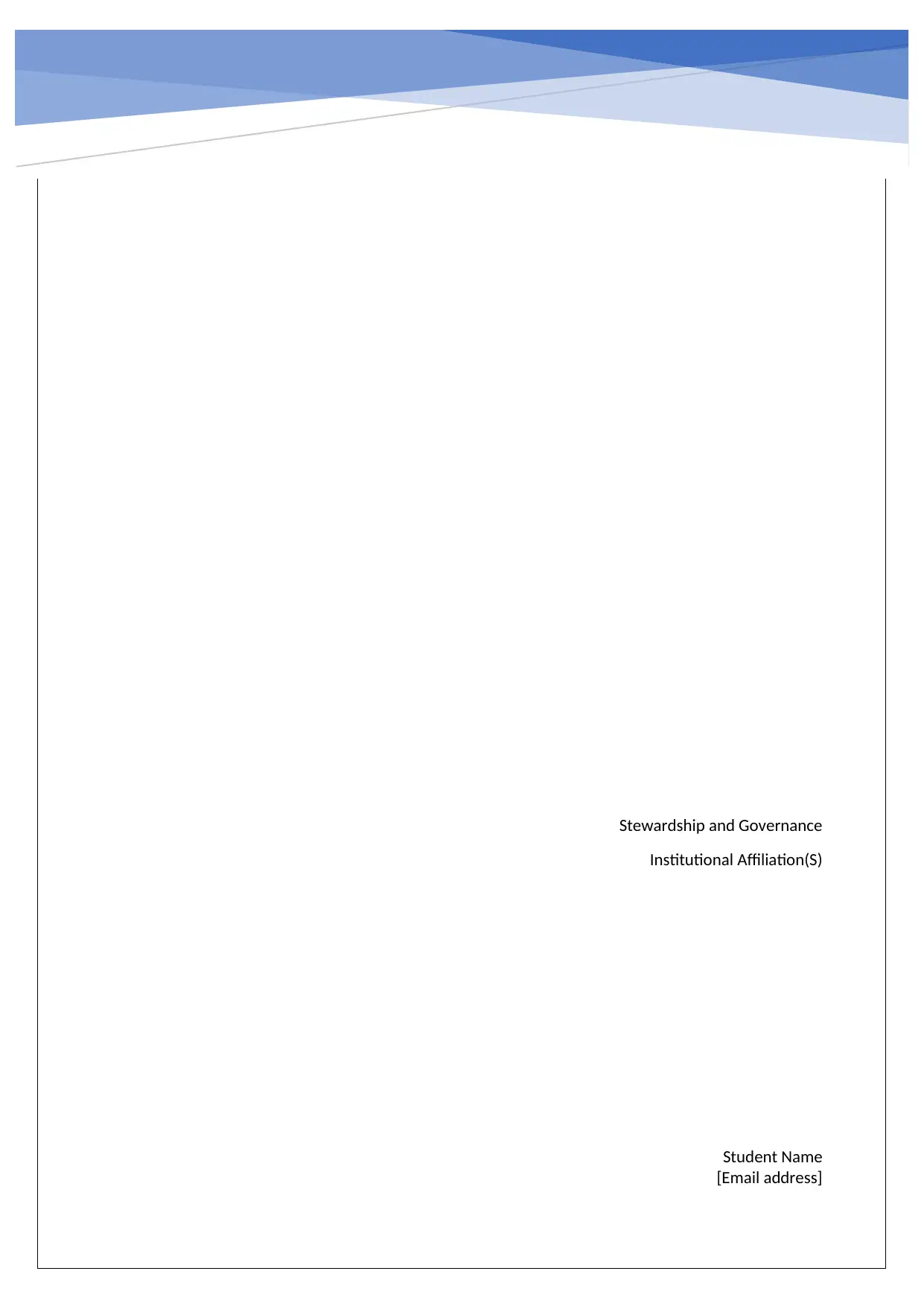
Stewardship and Governance
Institutional Affiliation(S)
Student Name
[Email address]
Institutional Affiliation(S)
Student Name
[Email address]
Paraphrase This Document
Need a fresh take? Get an instant paraphrase of this document with our AI Paraphraser
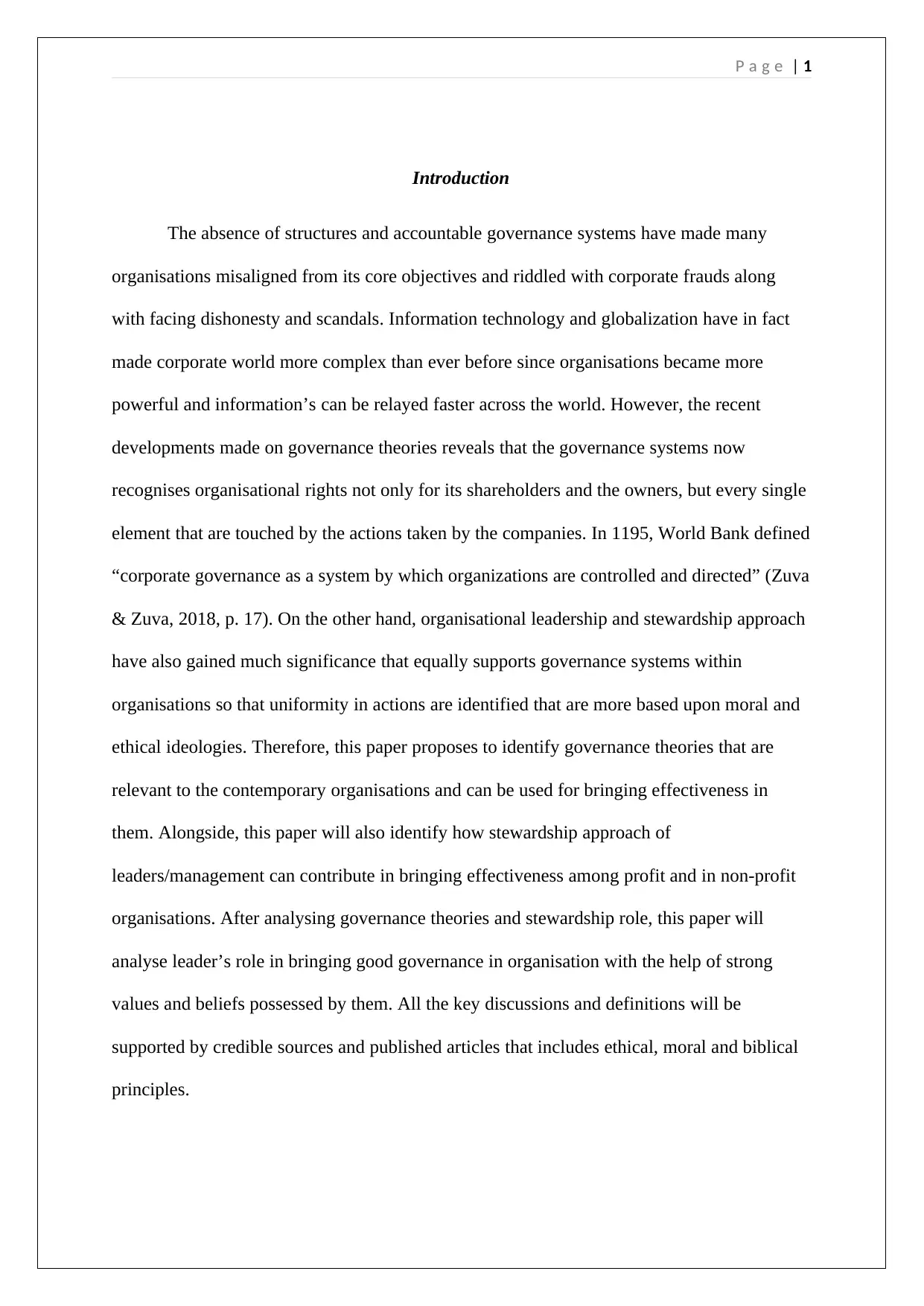
P a g e | 1
Introduction
The absence of structures and accountable governance systems have made many
organisations misaligned from its core objectives and riddled with corporate frauds along
with facing dishonesty and scandals. Information technology and globalization have in fact
made corporate world more complex than ever before since organisations became more
powerful and information’s can be relayed faster across the world. However, the recent
developments made on governance theories reveals that the governance systems now
recognises organisational rights not only for its shareholders and the owners, but every single
element that are touched by the actions taken by the companies. In 1195, World Bank defined
“corporate governance as a system by which organizations are controlled and directed” (Zuva
& Zuva, 2018, p. 17). On the other hand, organisational leadership and stewardship approach
have also gained much significance that equally supports governance systems within
organisations so that uniformity in actions are identified that are more based upon moral and
ethical ideologies. Therefore, this paper proposes to identify governance theories that are
relevant to the contemporary organisations and can be used for bringing effectiveness in
them. Alongside, this paper will also identify how stewardship approach of
leaders/management can contribute in bringing effectiveness among profit and in non-profit
organisations. After analysing governance theories and stewardship role, this paper will
analyse leader’s role in bringing good governance in organisation with the help of strong
values and beliefs possessed by them. All the key discussions and definitions will be
supported by credible sources and published articles that includes ethical, moral and biblical
principles.
Introduction
The absence of structures and accountable governance systems have made many
organisations misaligned from its core objectives and riddled with corporate frauds along
with facing dishonesty and scandals. Information technology and globalization have in fact
made corporate world more complex than ever before since organisations became more
powerful and information’s can be relayed faster across the world. However, the recent
developments made on governance theories reveals that the governance systems now
recognises organisational rights not only for its shareholders and the owners, but every single
element that are touched by the actions taken by the companies. In 1195, World Bank defined
“corporate governance as a system by which organizations are controlled and directed” (Zuva
& Zuva, 2018, p. 17). On the other hand, organisational leadership and stewardship approach
have also gained much significance that equally supports governance systems within
organisations so that uniformity in actions are identified that are more based upon moral and
ethical ideologies. Therefore, this paper proposes to identify governance theories that are
relevant to the contemporary organisations and can be used for bringing effectiveness in
them. Alongside, this paper will also identify how stewardship approach of
leaders/management can contribute in bringing effectiveness among profit and in non-profit
organisations. After analysing governance theories and stewardship role, this paper will
analyse leader’s role in bringing good governance in organisation with the help of strong
values and beliefs possessed by them. All the key discussions and definitions will be
supported by credible sources and published articles that includes ethical, moral and biblical
principles.
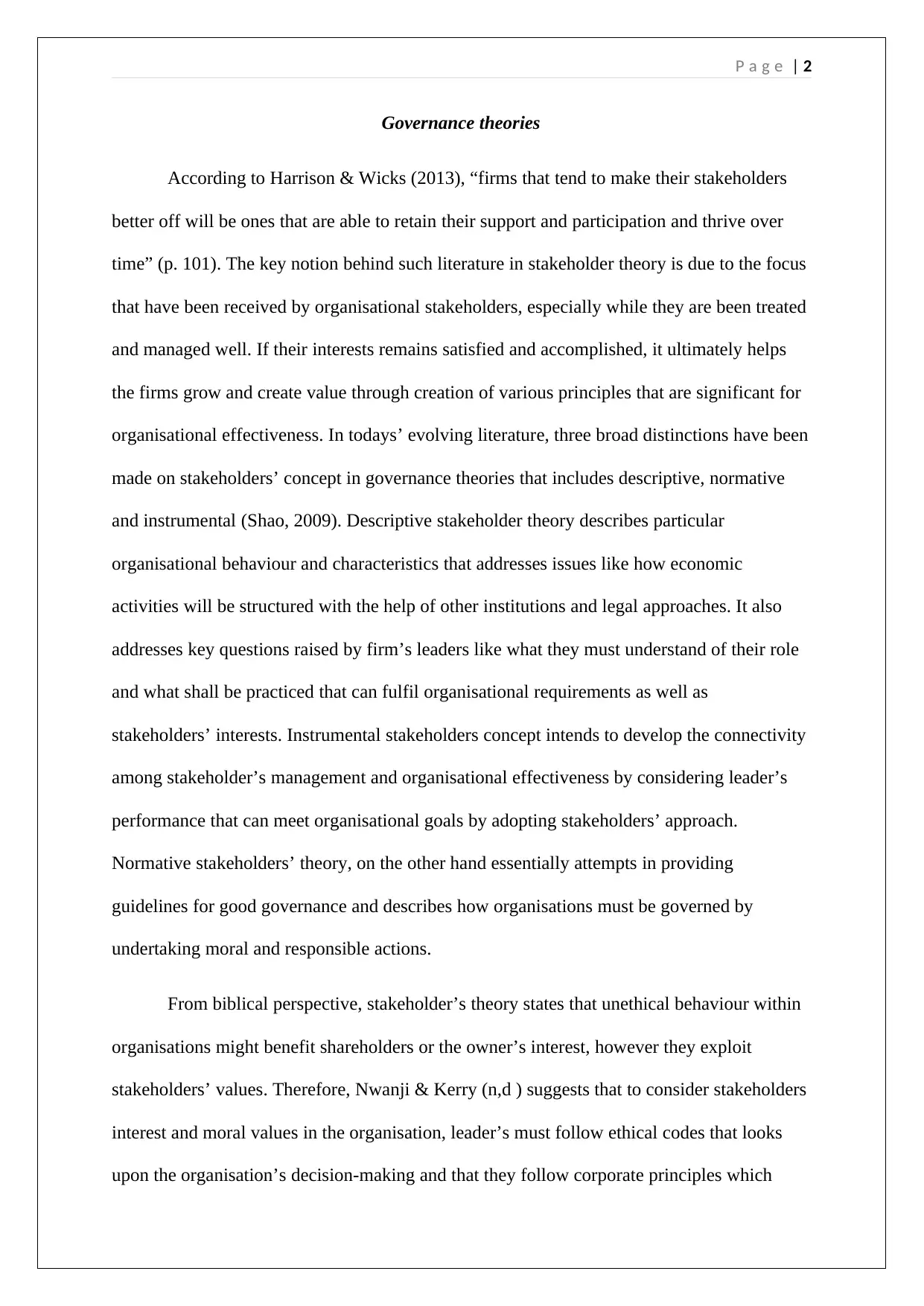
P a g e | 2
Governance theories
According to Harrison & Wicks (2013), “firms that tend to make their stakeholders
better off will be ones that are able to retain their support and participation and thrive over
time” (p. 101). The key notion behind such literature in stakeholder theory is due to the focus
that have been received by organisational stakeholders, especially while they are been treated
and managed well. If their interests remains satisfied and accomplished, it ultimately helps
the firms grow and create value through creation of various principles that are significant for
organisational effectiveness. In todays’ evolving literature, three broad distinctions have been
made on stakeholders’ concept in governance theories that includes descriptive, normative
and instrumental (Shao, 2009). Descriptive stakeholder theory describes particular
organisational behaviour and characteristics that addresses issues like how economic
activities will be structured with the help of other institutions and legal approaches. It also
addresses key questions raised by firm’s leaders like what they must understand of their role
and what shall be practiced that can fulfil organisational requirements as well as
stakeholders’ interests. Instrumental stakeholders concept intends to develop the connectivity
among stakeholder’s management and organisational effectiveness by considering leader’s
performance that can meet organisational goals by adopting stakeholders’ approach.
Normative stakeholders’ theory, on the other hand essentially attempts in providing
guidelines for good governance and describes how organisations must be governed by
undertaking moral and responsible actions.
From biblical perspective, stakeholder’s theory states that unethical behaviour within
organisations might benefit shareholders or the owner’s interest, however they exploit
stakeholders’ values. Therefore, Nwanji & Kerry (n,d ) suggests that to consider stakeholders
interest and moral values in the organisation, leader’s must follow ethical codes that looks
upon the organisation’s decision-making and that they follow corporate principles which
Governance theories
According to Harrison & Wicks (2013), “firms that tend to make their stakeholders
better off will be ones that are able to retain their support and participation and thrive over
time” (p. 101). The key notion behind such literature in stakeholder theory is due to the focus
that have been received by organisational stakeholders, especially while they are been treated
and managed well. If their interests remains satisfied and accomplished, it ultimately helps
the firms grow and create value through creation of various principles that are significant for
organisational effectiveness. In todays’ evolving literature, three broad distinctions have been
made on stakeholders’ concept in governance theories that includes descriptive, normative
and instrumental (Shao, 2009). Descriptive stakeholder theory describes particular
organisational behaviour and characteristics that addresses issues like how economic
activities will be structured with the help of other institutions and legal approaches. It also
addresses key questions raised by firm’s leaders like what they must understand of their role
and what shall be practiced that can fulfil organisational requirements as well as
stakeholders’ interests. Instrumental stakeholders concept intends to develop the connectivity
among stakeholder’s management and organisational effectiveness by considering leader’s
performance that can meet organisational goals by adopting stakeholders’ approach.
Normative stakeholders’ theory, on the other hand essentially attempts in providing
guidelines for good governance and describes how organisations must be governed by
undertaking moral and responsible actions.
From biblical perspective, stakeholder’s theory states that unethical behaviour within
organisations might benefit shareholders or the owner’s interest, however they exploit
stakeholders’ values. Therefore, Nwanji & Kerry (n,d ) suggests that to consider stakeholders
interest and moral values in the organisation, leader’s must follow ethical codes that looks
upon the organisation’s decision-making and that they follow corporate principles which
⊘ This is a preview!⊘
Do you want full access?
Subscribe today to unlock all pages.

Trusted by 1+ million students worldwide
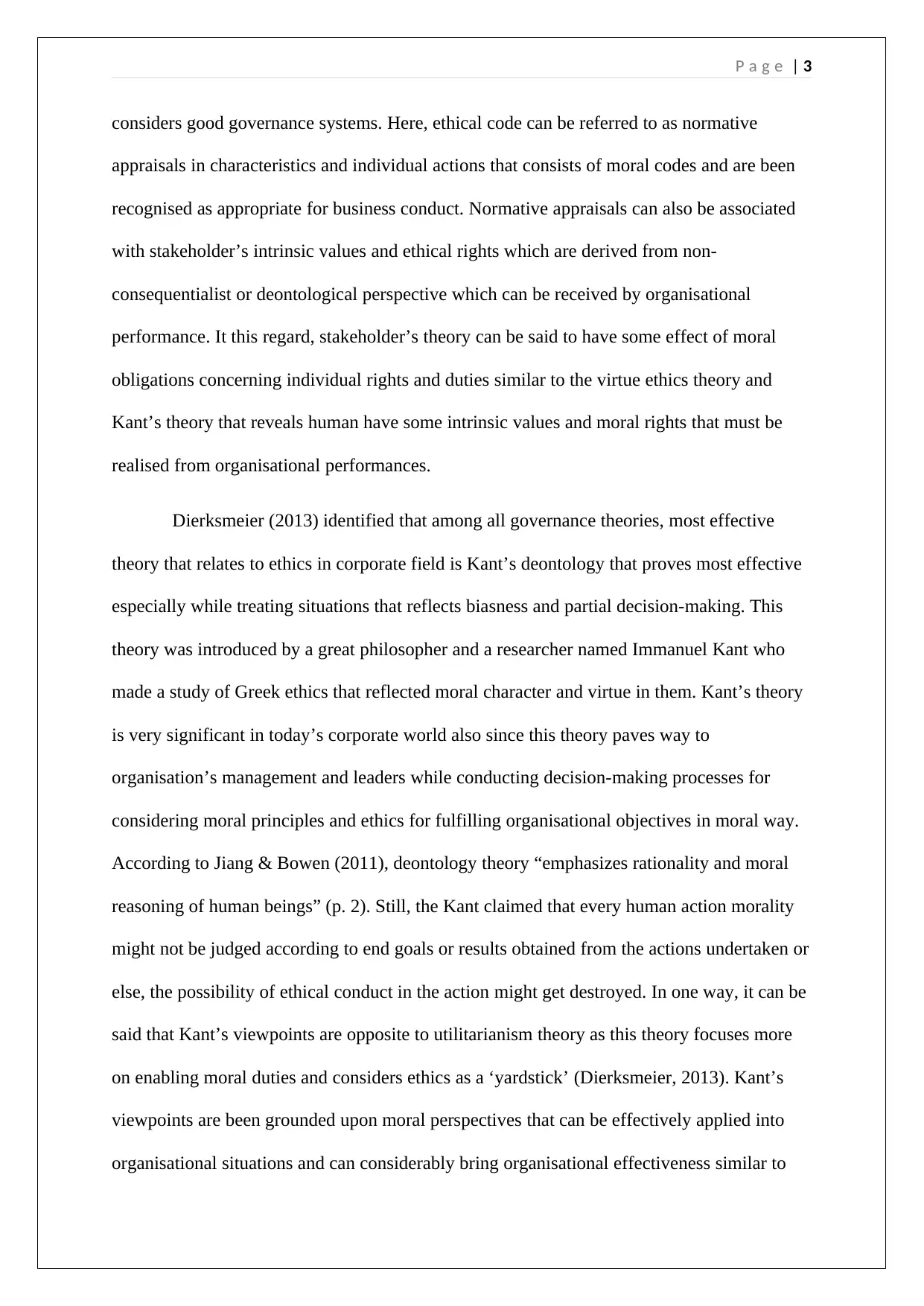
P a g e | 3
considers good governance systems. Here, ethical code can be referred to as normative
appraisals in characteristics and individual actions that consists of moral codes and are been
recognised as appropriate for business conduct. Normative appraisals can also be associated
with stakeholder’s intrinsic values and ethical rights which are derived from non-
consequentialist or deontological perspective which can be received by organisational
performance. It this regard, stakeholder’s theory can be said to have some effect of moral
obligations concerning individual rights and duties similar to the virtue ethics theory and
Kant’s theory that reveals human have some intrinsic values and moral rights that must be
realised from organisational performances.
Dierksmeier (2013) identified that among all governance theories, most effective
theory that relates to ethics in corporate field is Kant’s deontology that proves most effective
especially while treating situations that reflects biasness and partial decision-making. This
theory was introduced by a great philosopher and a researcher named Immanuel Kant who
made a study of Greek ethics that reflected moral character and virtue in them. Kant’s theory
is very significant in today’s corporate world also since this theory paves way to
organisation’s management and leaders while conducting decision-making processes for
considering moral principles and ethics for fulfilling organisational objectives in moral way.
According to Jiang & Bowen (2011), deontology theory “emphasizes rationality and moral
reasoning of human beings” (p. 2). Still, the Kant claimed that every human action morality
might not be judged according to end goals or results obtained from the actions undertaken or
else, the possibility of ethical conduct in the action might get destroyed. In one way, it can be
said that Kant’s viewpoints are opposite to utilitarianism theory as this theory focuses more
on enabling moral duties and considers ethics as a ‘yardstick’ (Dierksmeier, 2013). Kant’s
viewpoints are been grounded upon moral perspectives that can be effectively applied into
organisational situations and can considerably bring organisational effectiveness similar to
considers good governance systems. Here, ethical code can be referred to as normative
appraisals in characteristics and individual actions that consists of moral codes and are been
recognised as appropriate for business conduct. Normative appraisals can also be associated
with stakeholder’s intrinsic values and ethical rights which are derived from non-
consequentialist or deontological perspective which can be received by organisational
performance. It this regard, stakeholder’s theory can be said to have some effect of moral
obligations concerning individual rights and duties similar to the virtue ethics theory and
Kant’s theory that reveals human have some intrinsic values and moral rights that must be
realised from organisational performances.
Dierksmeier (2013) identified that among all governance theories, most effective
theory that relates to ethics in corporate field is Kant’s deontology that proves most effective
especially while treating situations that reflects biasness and partial decision-making. This
theory was introduced by a great philosopher and a researcher named Immanuel Kant who
made a study of Greek ethics that reflected moral character and virtue in them. Kant’s theory
is very significant in today’s corporate world also since this theory paves way to
organisation’s management and leaders while conducting decision-making processes for
considering moral principles and ethics for fulfilling organisational objectives in moral way.
According to Jiang & Bowen (2011), deontology theory “emphasizes rationality and moral
reasoning of human beings” (p. 2). Still, the Kant claimed that every human action morality
might not be judged according to end goals or results obtained from the actions undertaken or
else, the possibility of ethical conduct in the action might get destroyed. In one way, it can be
said that Kant’s viewpoints are opposite to utilitarianism theory as this theory focuses more
on enabling moral duties and considers ethics as a ‘yardstick’ (Dierksmeier, 2013). Kant’s
viewpoints are been grounded upon moral perspectives that can be effectively applied into
organisational situations and can considerably bring organisational effectiveness similar to
Paraphrase This Document
Need a fresh take? Get an instant paraphrase of this document with our AI Paraphraser
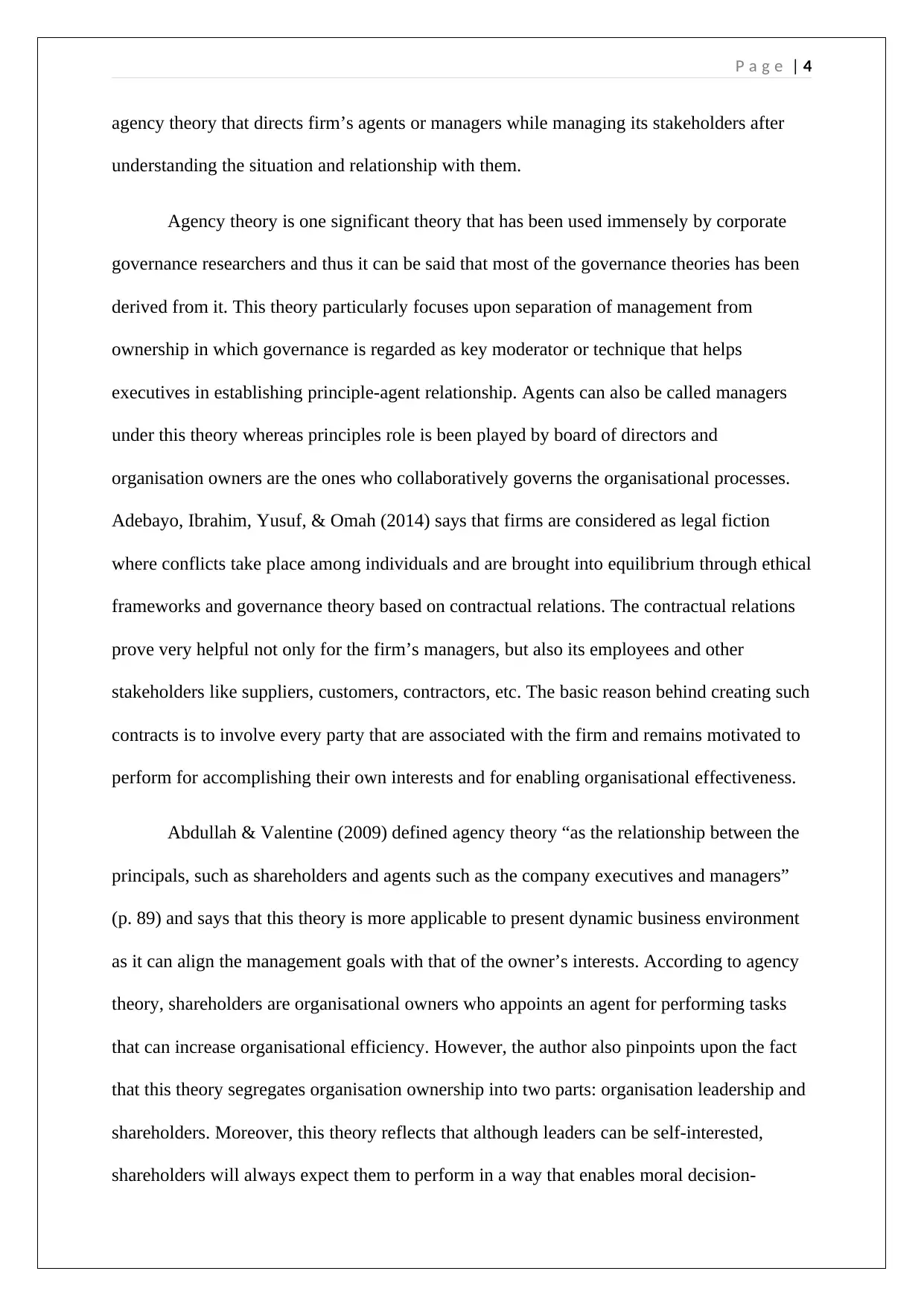
P a g e | 4
agency theory that directs firm’s agents or managers while managing its stakeholders after
understanding the situation and relationship with them.
Agency theory is one significant theory that has been used immensely by corporate
governance researchers and thus it can be said that most of the governance theories has been
derived from it. This theory particularly focuses upon separation of management from
ownership in which governance is regarded as key moderator or technique that helps
executives in establishing principle-agent relationship. Agents can also be called managers
under this theory whereas principles role is been played by board of directors and
organisation owners are the ones who collaboratively governs the organisational processes.
Adebayo, Ibrahim, Yusuf, & Omah (2014) says that firms are considered as legal fiction
where conflicts take place among individuals and are brought into equilibrium through ethical
frameworks and governance theory based on contractual relations. The contractual relations
prove very helpful not only for the firm’s managers, but also its employees and other
stakeholders like suppliers, customers, contractors, etc. The basic reason behind creating such
contracts is to involve every party that are associated with the firm and remains motivated to
perform for accomplishing their own interests and for enabling organisational effectiveness.
Abdullah & Valentine (2009) defined agency theory “as the relationship between the
principals, such as shareholders and agents such as the company executives and managers”
(p. 89) and says that this theory is more applicable to present dynamic business environment
as it can align the management goals with that of the owner’s interests. According to agency
theory, shareholders are organisational owners who appoints an agent for performing tasks
that can increase organisational efficiency. However, the author also pinpoints upon the fact
that this theory segregates organisation ownership into two parts: organisation leadership and
shareholders. Moreover, this theory reflects that although leaders can be self-interested,
shareholders will always expect them to perform in a way that enables moral decision-
agency theory that directs firm’s agents or managers while managing its stakeholders after
understanding the situation and relationship with them.
Agency theory is one significant theory that has been used immensely by corporate
governance researchers and thus it can be said that most of the governance theories has been
derived from it. This theory particularly focuses upon separation of management from
ownership in which governance is regarded as key moderator or technique that helps
executives in establishing principle-agent relationship. Agents can also be called managers
under this theory whereas principles role is been played by board of directors and
organisation owners are the ones who collaboratively governs the organisational processes.
Adebayo, Ibrahim, Yusuf, & Omah (2014) says that firms are considered as legal fiction
where conflicts take place among individuals and are brought into equilibrium through ethical
frameworks and governance theory based on contractual relations. The contractual relations
prove very helpful not only for the firm’s managers, but also its employees and other
stakeholders like suppliers, customers, contractors, etc. The basic reason behind creating such
contracts is to involve every party that are associated with the firm and remains motivated to
perform for accomplishing their own interests and for enabling organisational effectiveness.
Abdullah & Valentine (2009) defined agency theory “as the relationship between the
principals, such as shareholders and agents such as the company executives and managers”
(p. 89) and says that this theory is more applicable to present dynamic business environment
as it can align the management goals with that of the owner’s interests. According to agency
theory, shareholders are organisational owners who appoints an agent for performing tasks
that can increase organisational efficiency. However, the author also pinpoints upon the fact
that this theory segregates organisation ownership into two parts: organisation leadership and
shareholders. Moreover, this theory reflects that although leaders can be self-interested,
shareholders will always expect them to perform in a way that enables moral decision-
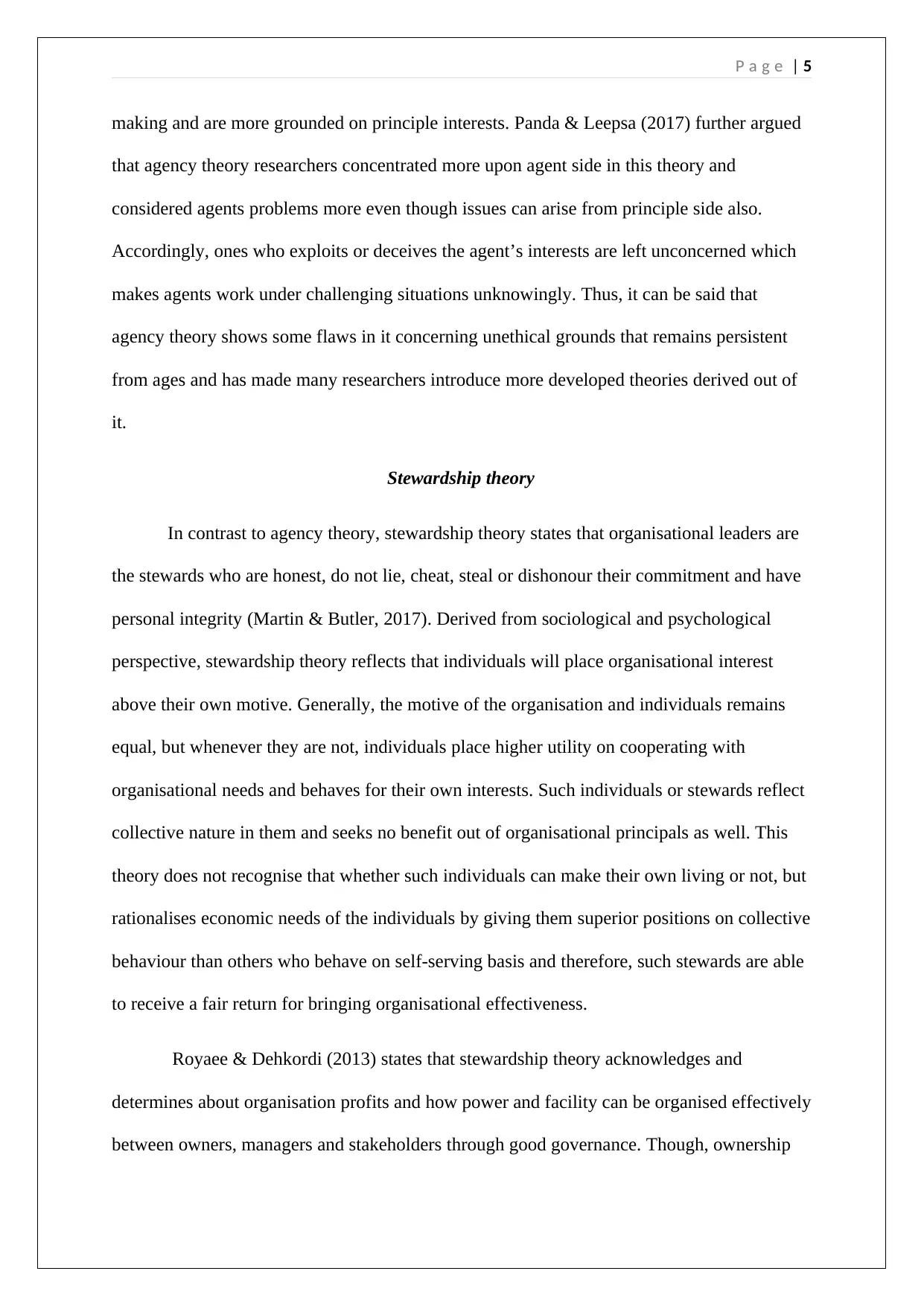
P a g e | 5
making and are more grounded on principle interests. Panda & Leepsa (2017) further argued
that agency theory researchers concentrated more upon agent side in this theory and
considered agents problems more even though issues can arise from principle side also.
Accordingly, ones who exploits or deceives the agent’s interests are left unconcerned which
makes agents work under challenging situations unknowingly. Thus, it can be said that
agency theory shows some flaws in it concerning unethical grounds that remains persistent
from ages and has made many researchers introduce more developed theories derived out of
it.
Stewardship theory
In contrast to agency theory, stewardship theory states that organisational leaders are
the stewards who are honest, do not lie, cheat, steal or dishonour their commitment and have
personal integrity (Martin & Butler, 2017). Derived from sociological and psychological
perspective, stewardship theory reflects that individuals will place organisational interest
above their own motive. Generally, the motive of the organisation and individuals remains
equal, but whenever they are not, individuals place higher utility on cooperating with
organisational needs and behaves for their own interests. Such individuals or stewards reflect
collective nature in them and seeks no benefit out of organisational principals as well. This
theory does not recognise that whether such individuals can make their own living or not, but
rationalises economic needs of the individuals by giving them superior positions on collective
behaviour than others who behave on self-serving basis and therefore, such stewards are able
to receive a fair return for bringing organisational effectiveness.
Royaee & Dehkordi (2013) states that stewardship theory acknowledges and
determines about organisation profits and how power and facility can be organised effectively
between owners, managers and stakeholders through good governance. Though, ownership
making and are more grounded on principle interests. Panda & Leepsa (2017) further argued
that agency theory researchers concentrated more upon agent side in this theory and
considered agents problems more even though issues can arise from principle side also.
Accordingly, ones who exploits or deceives the agent’s interests are left unconcerned which
makes agents work under challenging situations unknowingly. Thus, it can be said that
agency theory shows some flaws in it concerning unethical grounds that remains persistent
from ages and has made many researchers introduce more developed theories derived out of
it.
Stewardship theory
In contrast to agency theory, stewardship theory states that organisational leaders are
the stewards who are honest, do not lie, cheat, steal or dishonour their commitment and have
personal integrity (Martin & Butler, 2017). Derived from sociological and psychological
perspective, stewardship theory reflects that individuals will place organisational interest
above their own motive. Generally, the motive of the organisation and individuals remains
equal, but whenever they are not, individuals place higher utility on cooperating with
organisational needs and behaves for their own interests. Such individuals or stewards reflect
collective nature in them and seeks no benefit out of organisational principals as well. This
theory does not recognise that whether such individuals can make their own living or not, but
rationalises economic needs of the individuals by giving them superior positions on collective
behaviour than others who behave on self-serving basis and therefore, such stewards are able
to receive a fair return for bringing organisational effectiveness.
Royaee & Dehkordi (2013) states that stewardship theory acknowledges and
determines about organisation profits and how power and facility can be organised effectively
between owners, managers and stakeholders through good governance. Though, ownership
⊘ This is a preview!⊘
Do you want full access?
Subscribe today to unlock all pages.

Trusted by 1+ million students worldwide
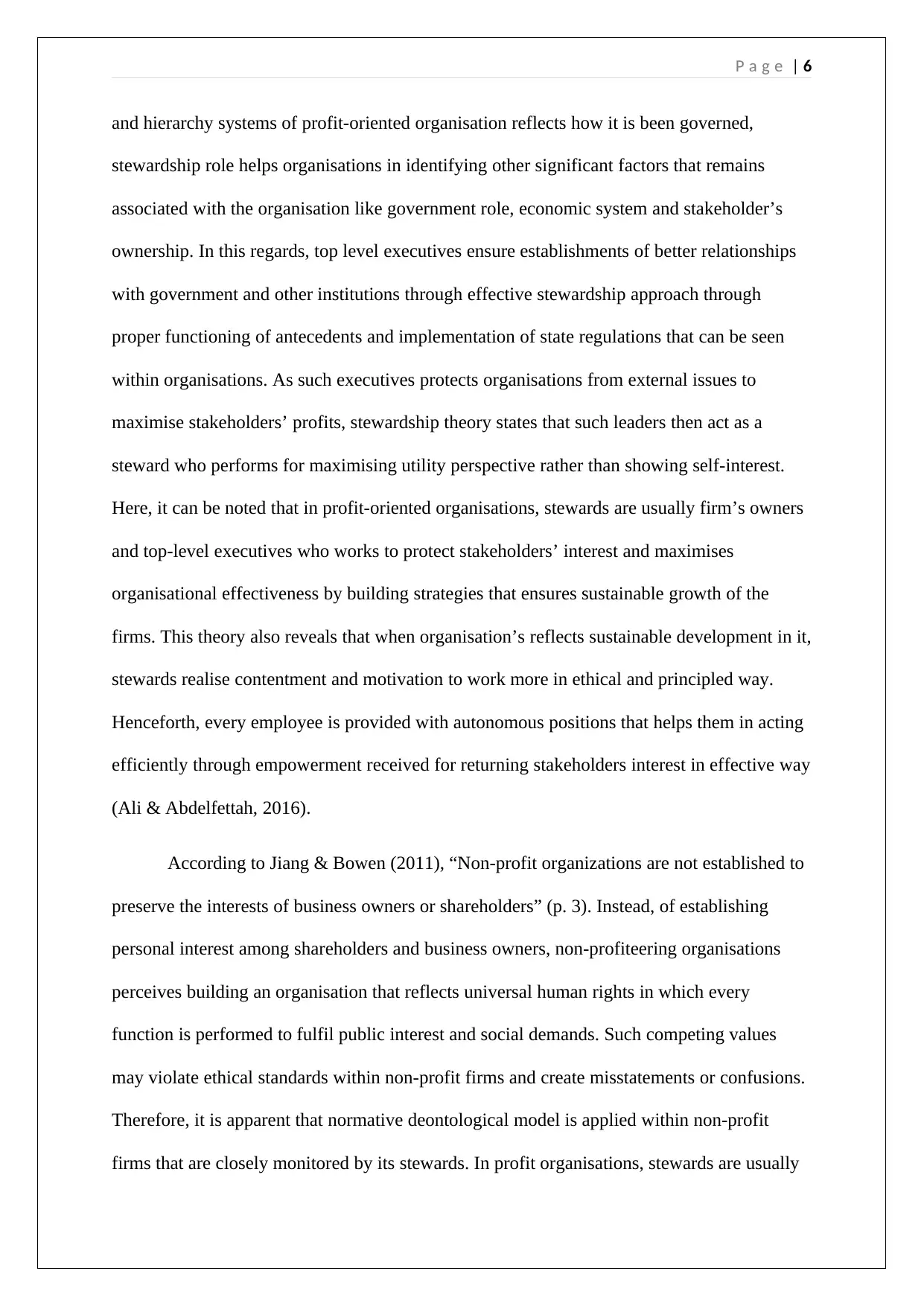
P a g e | 6
and hierarchy systems of profit-oriented organisation reflects how it is been governed,
stewardship role helps organisations in identifying other significant factors that remains
associated with the organisation like government role, economic system and stakeholder’s
ownership. In this regards, top level executives ensure establishments of better relationships
with government and other institutions through effective stewardship approach through
proper functioning of antecedents and implementation of state regulations that can be seen
within organisations. As such executives protects organisations from external issues to
maximise stakeholders’ profits, stewardship theory states that such leaders then act as a
steward who performs for maximising utility perspective rather than showing self-interest.
Here, it can be noted that in profit-oriented organisations, stewards are usually firm’s owners
and top-level executives who works to protect stakeholders’ interest and maximises
organisational effectiveness by building strategies that ensures sustainable growth of the
firms. This theory also reveals that when organisation’s reflects sustainable development in it,
stewards realise contentment and motivation to work more in ethical and principled way.
Henceforth, every employee is provided with autonomous positions that helps them in acting
efficiently through empowerment received for returning stakeholders interest in effective way
(Ali & Abdelfettah, 2016).
According to Jiang & Bowen (2011), “Non-profit organizations are not established to
preserve the interests of business owners or shareholders” (p. 3). Instead, of establishing
personal interest among shareholders and business owners, non-profiteering organisations
perceives building an organisation that reflects universal human rights in which every
function is performed to fulfil public interest and social demands. Such competing values
may violate ethical standards within non-profit firms and create misstatements or confusions.
Therefore, it is apparent that normative deontological model is applied within non-profit
firms that are closely monitored by its stewards. In profit organisations, stewards are usually
and hierarchy systems of profit-oriented organisation reflects how it is been governed,
stewardship role helps organisations in identifying other significant factors that remains
associated with the organisation like government role, economic system and stakeholder’s
ownership. In this regards, top level executives ensure establishments of better relationships
with government and other institutions through effective stewardship approach through
proper functioning of antecedents and implementation of state regulations that can be seen
within organisations. As such executives protects organisations from external issues to
maximise stakeholders’ profits, stewardship theory states that such leaders then act as a
steward who performs for maximising utility perspective rather than showing self-interest.
Here, it can be noted that in profit-oriented organisations, stewards are usually firm’s owners
and top-level executives who works to protect stakeholders’ interest and maximises
organisational effectiveness by building strategies that ensures sustainable growth of the
firms. This theory also reveals that when organisation’s reflects sustainable development in it,
stewards realise contentment and motivation to work more in ethical and principled way.
Henceforth, every employee is provided with autonomous positions that helps them in acting
efficiently through empowerment received for returning stakeholders interest in effective way
(Ali & Abdelfettah, 2016).
According to Jiang & Bowen (2011), “Non-profit organizations are not established to
preserve the interests of business owners or shareholders” (p. 3). Instead, of establishing
personal interest among shareholders and business owners, non-profiteering organisations
perceives building an organisation that reflects universal human rights in which every
function is performed to fulfil public interest and social demands. Such competing values
may violate ethical standards within non-profit firms and create misstatements or confusions.
Therefore, it is apparent that normative deontological model is applied within non-profit
firms that are closely monitored by its stewards. In profit organisations, stewards are usually
Paraphrase This Document
Need a fresh take? Get an instant paraphrase of this document with our AI Paraphraser
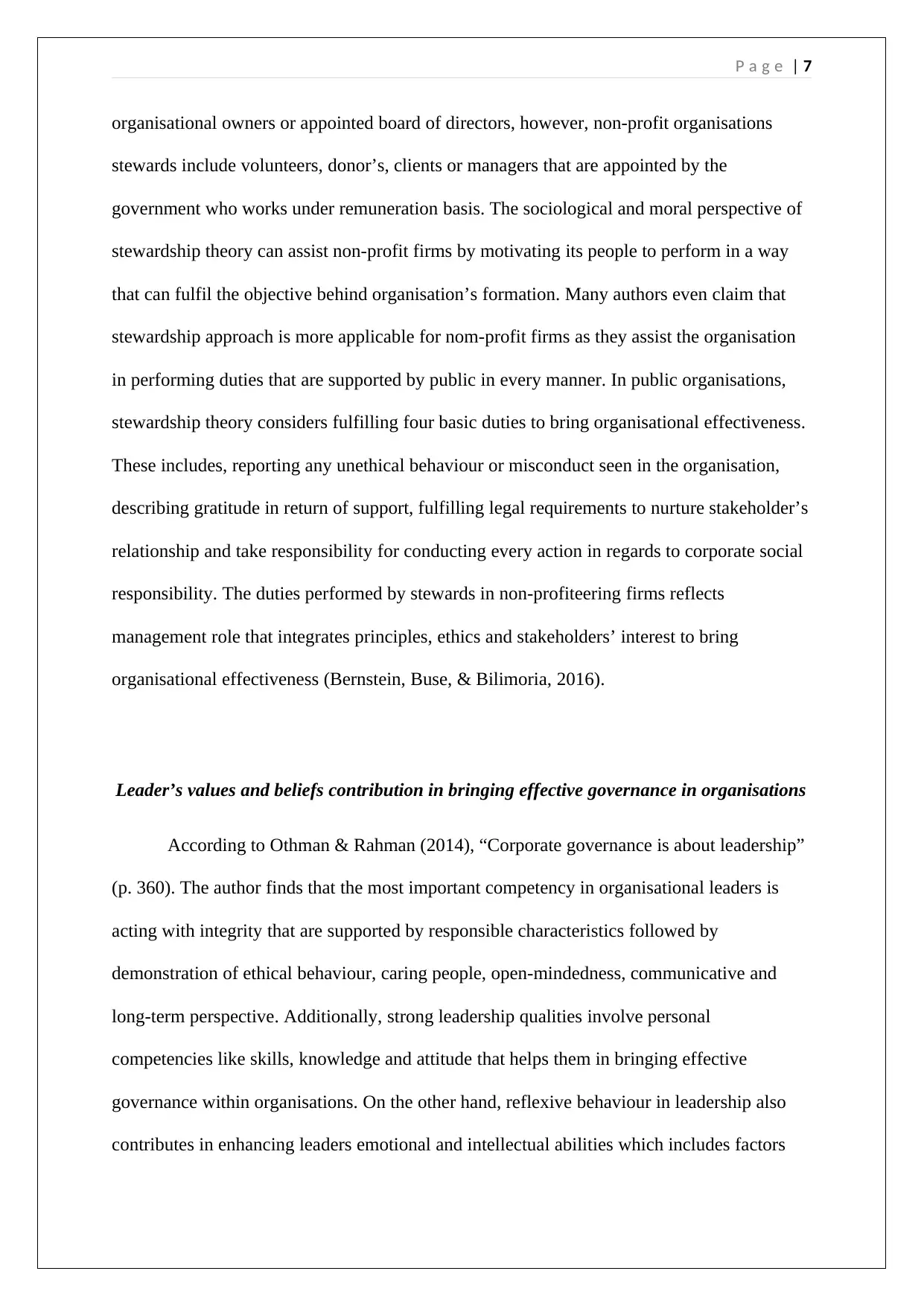
P a g e | 7
organisational owners or appointed board of directors, however, non-profit organisations
stewards include volunteers, donor’s, clients or managers that are appointed by the
government who works under remuneration basis. The sociological and moral perspective of
stewardship theory can assist non-profit firms by motivating its people to perform in a way
that can fulfil the objective behind organisation’s formation. Many authors even claim that
stewardship approach is more applicable for nom-profit firms as they assist the organisation
in performing duties that are supported by public in every manner. In public organisations,
stewardship theory considers fulfilling four basic duties to bring organisational effectiveness.
These includes, reporting any unethical behaviour or misconduct seen in the organisation,
describing gratitude in return of support, fulfilling legal requirements to nurture stakeholder’s
relationship and take responsibility for conducting every action in regards to corporate social
responsibility. The duties performed by stewards in non-profiteering firms reflects
management role that integrates principles, ethics and stakeholders’ interest to bring
organisational effectiveness (Bernstein, Buse, & Bilimoria, 2016).
Leader’s values and beliefs contribution in bringing effective governance in organisations
According to Othman & Rahman (2014), “Corporate governance is about leadership”
(p. 360). The author finds that the most important competency in organisational leaders is
acting with integrity that are supported by responsible characteristics followed by
demonstration of ethical behaviour, caring people, open-mindedness, communicative and
long-term perspective. Additionally, strong leadership qualities involve personal
competencies like skills, knowledge and attitude that helps them in bringing effective
governance within organisations. On the other hand, reflexive behaviour in leadership also
contributes in enhancing leaders emotional and intellectual abilities which includes factors
organisational owners or appointed board of directors, however, non-profit organisations
stewards include volunteers, donor’s, clients or managers that are appointed by the
government who works under remuneration basis. The sociological and moral perspective of
stewardship theory can assist non-profit firms by motivating its people to perform in a way
that can fulfil the objective behind organisation’s formation. Many authors even claim that
stewardship approach is more applicable for nom-profit firms as they assist the organisation
in performing duties that are supported by public in every manner. In public organisations,
stewardship theory considers fulfilling four basic duties to bring organisational effectiveness.
These includes, reporting any unethical behaviour or misconduct seen in the organisation,
describing gratitude in return of support, fulfilling legal requirements to nurture stakeholder’s
relationship and take responsibility for conducting every action in regards to corporate social
responsibility. The duties performed by stewards in non-profiteering firms reflects
management role that integrates principles, ethics and stakeholders’ interest to bring
organisational effectiveness (Bernstein, Buse, & Bilimoria, 2016).
Leader’s values and beliefs contribution in bringing effective governance in organisations
According to Othman & Rahman (2014), “Corporate governance is about leadership”
(p. 360). The author finds that the most important competency in organisational leaders is
acting with integrity that are supported by responsible characteristics followed by
demonstration of ethical behaviour, caring people, open-mindedness, communicative and
long-term perspective. Additionally, strong leadership qualities involve personal
competencies like skills, knowledge and attitude that helps them in bringing effective
governance within organisations. On the other hand, reflexive behaviour in leadership also
contributes in enhancing leaders emotional and intellectual abilities which includes factors
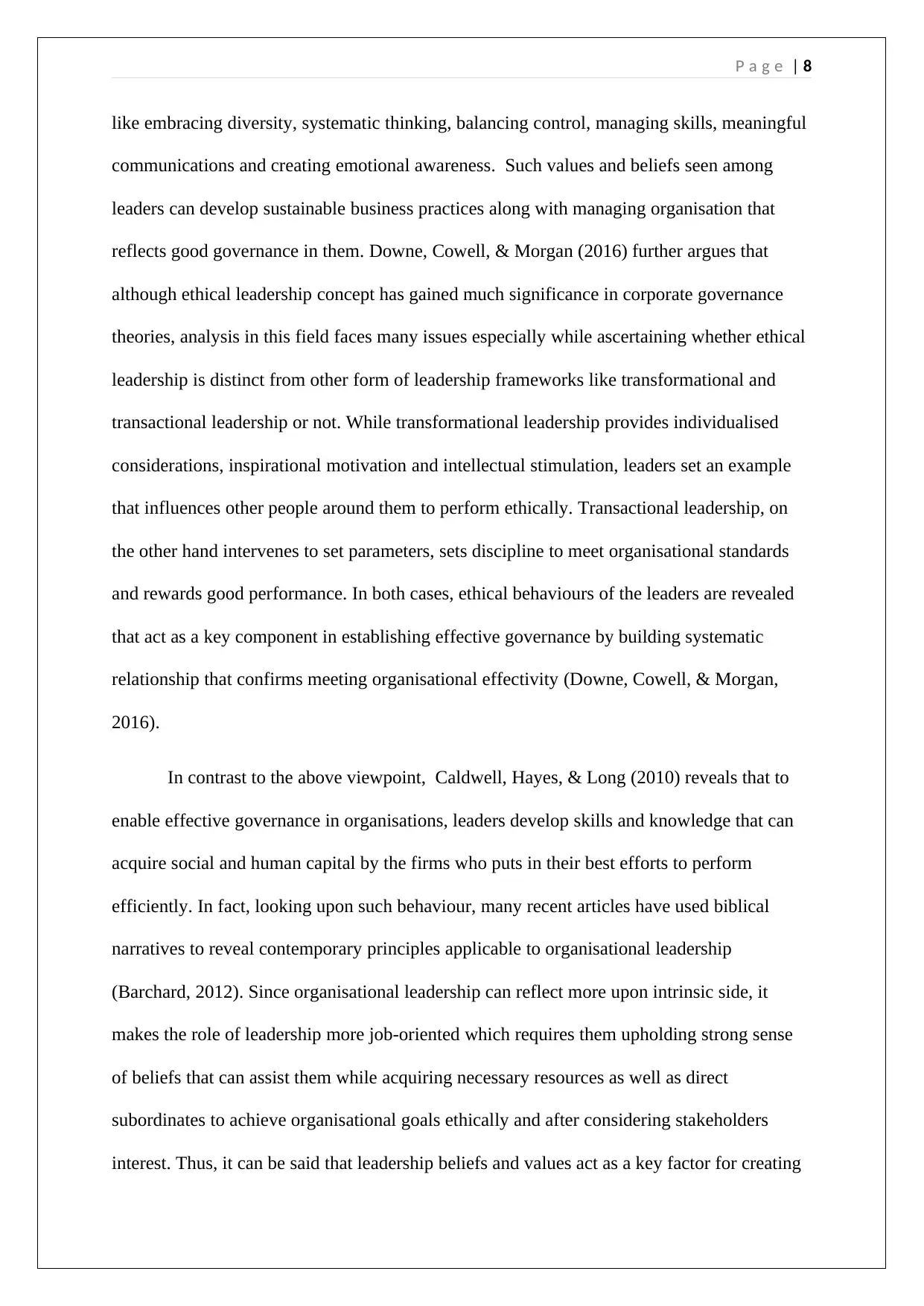
P a g e | 8
like embracing diversity, systematic thinking, balancing control, managing skills, meaningful
communications and creating emotional awareness. Such values and beliefs seen among
leaders can develop sustainable business practices along with managing organisation that
reflects good governance in them. Downe, Cowell, & Morgan (2016) further argues that
although ethical leadership concept has gained much significance in corporate governance
theories, analysis in this field faces many issues especially while ascertaining whether ethical
leadership is distinct from other form of leadership frameworks like transformational and
transactional leadership or not. While transformational leadership provides individualised
considerations, inspirational motivation and intellectual stimulation, leaders set an example
that influences other people around them to perform ethically. Transactional leadership, on
the other hand intervenes to set parameters, sets discipline to meet organisational standards
and rewards good performance. In both cases, ethical behaviours of the leaders are revealed
that act as a key component in establishing effective governance by building systematic
relationship that confirms meeting organisational effectivity (Downe, Cowell, & Morgan,
2016).
In contrast to the above viewpoint, Caldwell, Hayes, & Long (2010) reveals that to
enable effective governance in organisations, leaders develop skills and knowledge that can
acquire social and human capital by the firms who puts in their best efforts to perform
efficiently. In fact, looking upon such behaviour, many recent articles have used biblical
narratives to reveal contemporary principles applicable to organisational leadership
(Barchard, 2012). Since organisational leadership can reflect more upon intrinsic side, it
makes the role of leadership more job-oriented which requires them upholding strong sense
of beliefs that can assist them while acquiring necessary resources as well as direct
subordinates to achieve organisational goals ethically and after considering stakeholders
interest. Thus, it can be said that leadership beliefs and values act as a key factor for creating
like embracing diversity, systematic thinking, balancing control, managing skills, meaningful
communications and creating emotional awareness. Such values and beliefs seen among
leaders can develop sustainable business practices along with managing organisation that
reflects good governance in them. Downe, Cowell, & Morgan (2016) further argues that
although ethical leadership concept has gained much significance in corporate governance
theories, analysis in this field faces many issues especially while ascertaining whether ethical
leadership is distinct from other form of leadership frameworks like transformational and
transactional leadership or not. While transformational leadership provides individualised
considerations, inspirational motivation and intellectual stimulation, leaders set an example
that influences other people around them to perform ethically. Transactional leadership, on
the other hand intervenes to set parameters, sets discipline to meet organisational standards
and rewards good performance. In both cases, ethical behaviours of the leaders are revealed
that act as a key component in establishing effective governance by building systematic
relationship that confirms meeting organisational effectivity (Downe, Cowell, & Morgan,
2016).
In contrast to the above viewpoint, Caldwell, Hayes, & Long (2010) reveals that to
enable effective governance in organisations, leaders develop skills and knowledge that can
acquire social and human capital by the firms who puts in their best efforts to perform
efficiently. In fact, looking upon such behaviour, many recent articles have used biblical
narratives to reveal contemporary principles applicable to organisational leadership
(Barchard, 2012). Since organisational leadership can reflect more upon intrinsic side, it
makes the role of leadership more job-oriented which requires them upholding strong sense
of beliefs that can assist them while acquiring necessary resources as well as direct
subordinates to achieve organisational goals ethically and after considering stakeholders
interest. Thus, it can be said that leadership beliefs and values act as a key factor for creating
⊘ This is a preview!⊘
Do you want full access?
Subscribe today to unlock all pages.

Trusted by 1+ million students worldwide
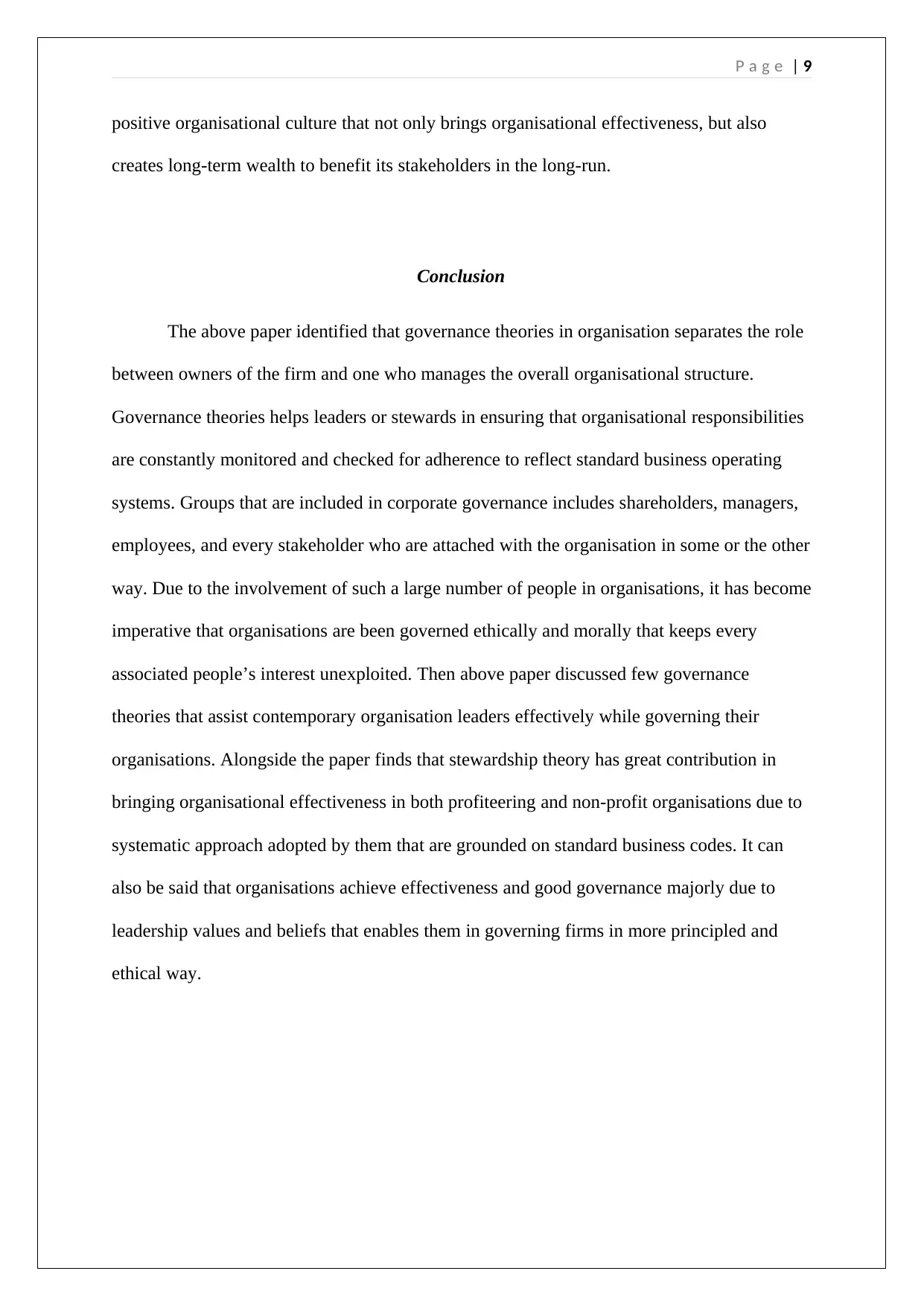
P a g e | 9
positive organisational culture that not only brings organisational effectiveness, but also
creates long-term wealth to benefit its stakeholders in the long-run.
Conclusion
The above paper identified that governance theories in organisation separates the role
between owners of the firm and one who manages the overall organisational structure.
Governance theories helps leaders or stewards in ensuring that organisational responsibilities
are constantly monitored and checked for adherence to reflect standard business operating
systems. Groups that are included in corporate governance includes shareholders, managers,
employees, and every stakeholder who are attached with the organisation in some or the other
way. Due to the involvement of such a large number of people in organisations, it has become
imperative that organisations are been governed ethically and morally that keeps every
associated people’s interest unexploited. Then above paper discussed few governance
theories that assist contemporary organisation leaders effectively while governing their
organisations. Alongside the paper finds that stewardship theory has great contribution in
bringing organisational effectiveness in both profiteering and non-profit organisations due to
systematic approach adopted by them that are grounded on standard business codes. It can
also be said that organisations achieve effectiveness and good governance majorly due to
leadership values and beliefs that enables them in governing firms in more principled and
ethical way.
positive organisational culture that not only brings organisational effectiveness, but also
creates long-term wealth to benefit its stakeholders in the long-run.
Conclusion
The above paper identified that governance theories in organisation separates the role
between owners of the firm and one who manages the overall organisational structure.
Governance theories helps leaders or stewards in ensuring that organisational responsibilities
are constantly monitored and checked for adherence to reflect standard business operating
systems. Groups that are included in corporate governance includes shareholders, managers,
employees, and every stakeholder who are attached with the organisation in some or the other
way. Due to the involvement of such a large number of people in organisations, it has become
imperative that organisations are been governed ethically and morally that keeps every
associated people’s interest unexploited. Then above paper discussed few governance
theories that assist contemporary organisation leaders effectively while governing their
organisations. Alongside the paper finds that stewardship theory has great contribution in
bringing organisational effectiveness in both profiteering and non-profit organisations due to
systematic approach adopted by them that are grounded on standard business codes. It can
also be said that organisations achieve effectiveness and good governance majorly due to
leadership values and beliefs that enables them in governing firms in more principled and
ethical way.
Paraphrase This Document
Need a fresh take? Get an instant paraphrase of this document with our AI Paraphraser
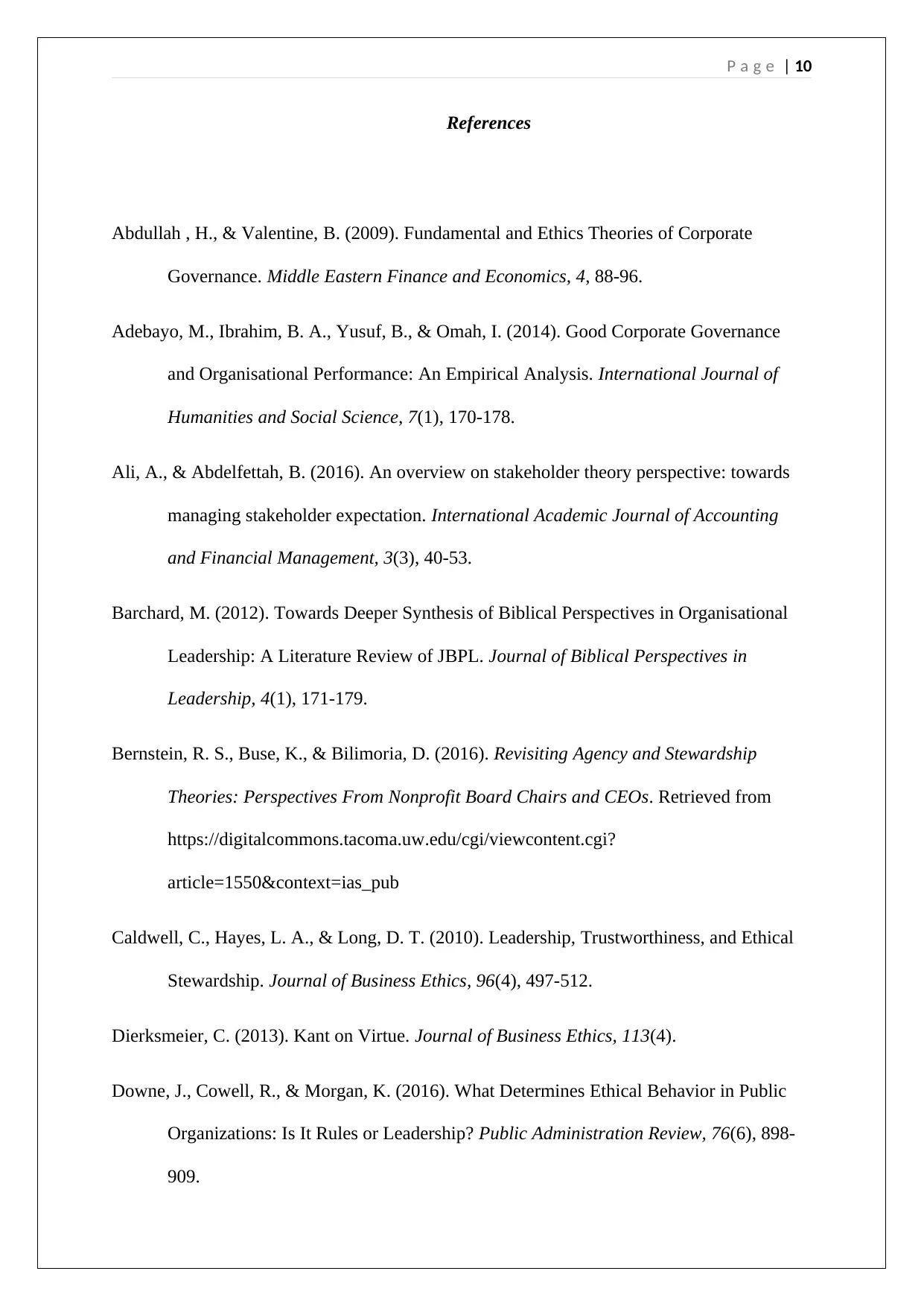
P a g e | 10
References
Abdullah , H., & Valentine, B. (2009). Fundamental and Ethics Theories of Corporate
Governance. Middle Eastern Finance and Economics, 4, 88-96.
Adebayo, M., Ibrahim, B. A., Yusuf, B., & Omah, I. (2014). Good Corporate Governance
and Organisational Performance: An Empirical Analysis. International Journal of
Humanities and Social Science, 7(1), 170-178.
Ali, A., & Abdelfettah, B. (2016). An overview on stakeholder theory perspective: towards
managing stakeholder expectation. International Academic Journal of Accounting
and Financial Management, 3(3), 40-53.
Barchard, M. (2012). Towards Deeper Synthesis of Biblical Perspectives in Organisational
Leadership: A Literature Review of JBPL. Journal of Biblical Perspectives in
Leadership, 4(1), 171-179.
Bernstein, R. S., Buse, K., & Bilimoria, D. (2016). Revisiting Agency and Stewardship
Theories: Perspectives From Nonprofit Board Chairs and CEOs. Retrieved from
https://digitalcommons.tacoma.uw.edu/cgi/viewcontent.cgi?
article=1550&context=ias_pub
Caldwell, C., Hayes, L. A., & Long, D. T. (2010). Leadership, Trustworthiness, and Ethical
Stewardship. Journal of Business Ethics, 96(4), 497-512.
Dierksmeier, C. (2013). Kant on Virtue. Journal of Business Ethics, 113(4).
Downe, J., Cowell, R., & Morgan, K. (2016). What Determines Ethical Behavior in Public
Organizations: Is It Rules or Leadership? Public Administration Review, 76(6), 898-
909.
References
Abdullah , H., & Valentine, B. (2009). Fundamental and Ethics Theories of Corporate
Governance. Middle Eastern Finance and Economics, 4, 88-96.
Adebayo, M., Ibrahim, B. A., Yusuf, B., & Omah, I. (2014). Good Corporate Governance
and Organisational Performance: An Empirical Analysis. International Journal of
Humanities and Social Science, 7(1), 170-178.
Ali, A., & Abdelfettah, B. (2016). An overview on stakeholder theory perspective: towards
managing stakeholder expectation. International Academic Journal of Accounting
and Financial Management, 3(3), 40-53.
Barchard, M. (2012). Towards Deeper Synthesis of Biblical Perspectives in Organisational
Leadership: A Literature Review of JBPL. Journal of Biblical Perspectives in
Leadership, 4(1), 171-179.
Bernstein, R. S., Buse, K., & Bilimoria, D. (2016). Revisiting Agency and Stewardship
Theories: Perspectives From Nonprofit Board Chairs and CEOs. Retrieved from
https://digitalcommons.tacoma.uw.edu/cgi/viewcontent.cgi?
article=1550&context=ias_pub
Caldwell, C., Hayes, L. A., & Long, D. T. (2010). Leadership, Trustworthiness, and Ethical
Stewardship. Journal of Business Ethics, 96(4), 497-512.
Dierksmeier, C. (2013). Kant on Virtue. Journal of Business Ethics, 113(4).
Downe, J., Cowell, R., & Morgan, K. (2016). What Determines Ethical Behavior in Public
Organizations: Is It Rules or Leadership? Public Administration Review, 76(6), 898-
909.
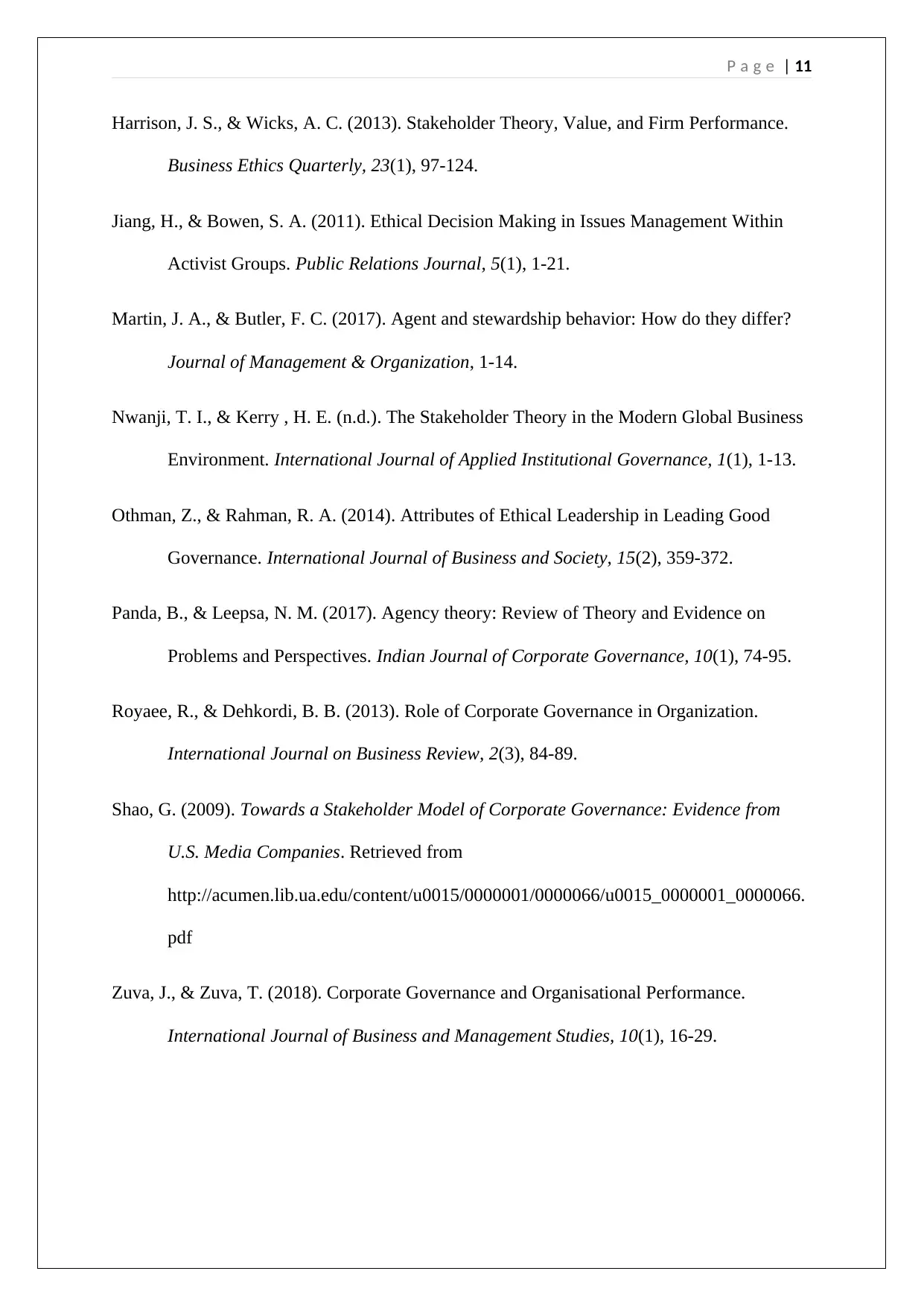
P a g e | 11
Harrison, J. S., & Wicks, A. C. (2013). Stakeholder Theory, Value, and Firm Performance.
Business Ethics Quarterly, 23(1), 97-124.
Jiang, H., & Bowen, S. A. (2011). Ethical Decision Making in Issues Management Within
Activist Groups. Public Relations Journal, 5(1), 1-21.
Martin, J. A., & Butler, F. C. (2017). Agent and stewardship behavior: How do they differ?
Journal of Management & Organization, 1-14.
Nwanji, T. I., & Kerry , H. E. (n.d.). The Stakeholder Theory in the Modern Global Business
Environment. International Journal of Applied Institutional Governance, 1(1), 1-13.
Othman, Z., & Rahman, R. A. (2014). Attributes of Ethical Leadership in Leading Good
Governance. International Journal of Business and Society, 15(2), 359-372.
Panda, B., & Leepsa, N. M. (2017). Agency theory: Review of Theory and Evidence on
Problems and Perspectives. Indian Journal of Corporate Governance, 10(1), 74-95.
Royaee, R., & Dehkordi, B. B. (2013). Role of Corporate Governance in Organization.
International Journal on Business Review, 2(3), 84-89.
Shao, G. (2009). Towards a Stakeholder Model of Corporate Governance: Evidence from
U.S. Media Companies. Retrieved from
http://acumen.lib.ua.edu/content/u0015/0000001/0000066/u0015_0000001_0000066.
pdf
Zuva, J., & Zuva, T. (2018). Corporate Governance and Organisational Performance.
International Journal of Business and Management Studies, 10(1), 16-29.
Harrison, J. S., & Wicks, A. C. (2013). Stakeholder Theory, Value, and Firm Performance.
Business Ethics Quarterly, 23(1), 97-124.
Jiang, H., & Bowen, S. A. (2011). Ethical Decision Making in Issues Management Within
Activist Groups. Public Relations Journal, 5(1), 1-21.
Martin, J. A., & Butler, F. C. (2017). Agent and stewardship behavior: How do they differ?
Journal of Management & Organization, 1-14.
Nwanji, T. I., & Kerry , H. E. (n.d.). The Stakeholder Theory in the Modern Global Business
Environment. International Journal of Applied Institutional Governance, 1(1), 1-13.
Othman, Z., & Rahman, R. A. (2014). Attributes of Ethical Leadership in Leading Good
Governance. International Journal of Business and Society, 15(2), 359-372.
Panda, B., & Leepsa, N. M. (2017). Agency theory: Review of Theory and Evidence on
Problems and Perspectives. Indian Journal of Corporate Governance, 10(1), 74-95.
Royaee, R., & Dehkordi, B. B. (2013). Role of Corporate Governance in Organization.
International Journal on Business Review, 2(3), 84-89.
Shao, G. (2009). Towards a Stakeholder Model of Corporate Governance: Evidence from
U.S. Media Companies. Retrieved from
http://acumen.lib.ua.edu/content/u0015/0000001/0000066/u0015_0000001_0000066.
Zuva, J., & Zuva, T. (2018). Corporate Governance and Organisational Performance.
International Journal of Business and Management Studies, 10(1), 16-29.
⊘ This is a preview!⊘
Do you want full access?
Subscribe today to unlock all pages.

Trusted by 1+ million students worldwide
1 out of 12
Related Documents
Your All-in-One AI-Powered Toolkit for Academic Success.
+13062052269
info@desklib.com
Available 24*7 on WhatsApp / Email
![[object Object]](/_next/static/media/star-bottom.7253800d.svg)
Unlock your academic potential
Copyright © 2020–2026 A2Z Services. All Rights Reserved. Developed and managed by ZUCOL.




